
Conducting an interview in tech: the 7 steps you need to take

How to take technical interview? Conducting an interview can be tricky when it comes to tech, mainly because many tech recruiters don’t possess the exact set of skills and expertise typical of the position they’re trying to fill. As a consequence, some HR professionals approach interviews with a high level of awkwardness, and in some cases, even anxiety. Let’s just say, the developers are not impressed. In fact, the word “interview” comes second on Stack Overflow‘s list of words used to describe the annoying part of job searching, and first on the list of words used to describe its exhausting part.
Do you want more info on technical interviews? Check out The ultimate guide to the technical interview.
 Source: Stack Overflow Developer Hiring Landscape 2018
Source: Stack Overflow Developer Hiring Landscape 2018
In other words, software engineers are not very fond of the interview. That’s really bad news because the candidate’s impression of a technical interview serves as a storefront for your entire organization. It gives them an idea of your company culture, your approach to tech, and your staff.
Conducting an interview in tech: 7 simple steps
To quote Sahat Yalkabov, Senior Frontend Engineer at Bloomberg LP
“Interviews shouldn’t be one-sided battles where a candidate must “prove“ themselves in order to get hired.”
Random questions simply don’t cut it anymore, they’re actually detrimental to your business. You should be focused on screening tech skills and having a comfortable conversation with the candidates rather than interrogating them with esoteric coding questions you most likely don’t even know the answer to.
Here are the basics of conducting an interview like a PRO.
1. Conduct fewer interviews by preselecting your candidates
This might sound counterintuitive because you might be tempted to think more interviews lead to more hires. However, the first step to conducting interviews efficiently is to limit the number of them. This allows you to focus on viable candidates and not waste time on those who don’t match the job description criteria.
According to Jobvite’s 2018 Recruiting Benchmark Report: How Do You Stack Up?, “The percentage of applicants who move forward to the interview stage decreased in 2017, to 12%”, which means that 1 out of 8 applicants gets invited to an interview (as opposed to 1 in 6 in 2016).
Jobvite suggests there are at least two reasons for this state of affairs:
- Fewer people are applying due to “low unemployment and an uncertain economy”
- Companies are now more efficient in preselecting candidates who they invite to an onsite interview thanks to the use of data and automation
If your Applicants to Interviews percentage is higher than 12%, you need to evaluate your process in terms of automation tools and most likely introduce changes.
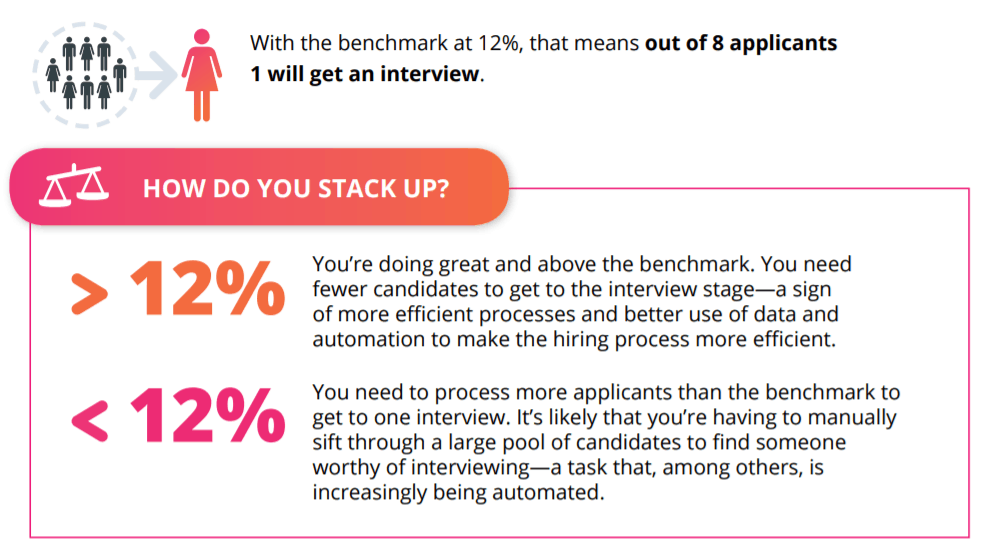 Source: Jobvite
Source: Jobvite
To limit the number of interviews, you need to screen software developers early in the process which results in fewer interviews and higher Offer Acceptance Rate.
Another aspect worth mentioning at this point is the number of interviews you need to conduct to make an offer. According to the 2017 MRINetwork Recruiter Sentiment Study, “Over 50 percent of recruiters and employers state the average number of interviews is three before an offer was made.”
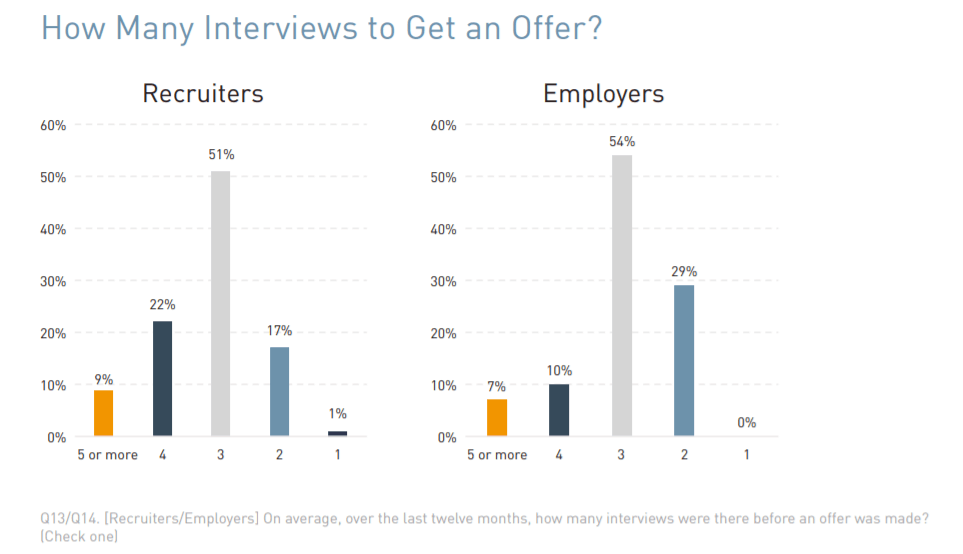 Source: MRINetwork
Source: MRINetwork
Interestingly, “candidates state 1 – 3 interviews is most common before an offer.”
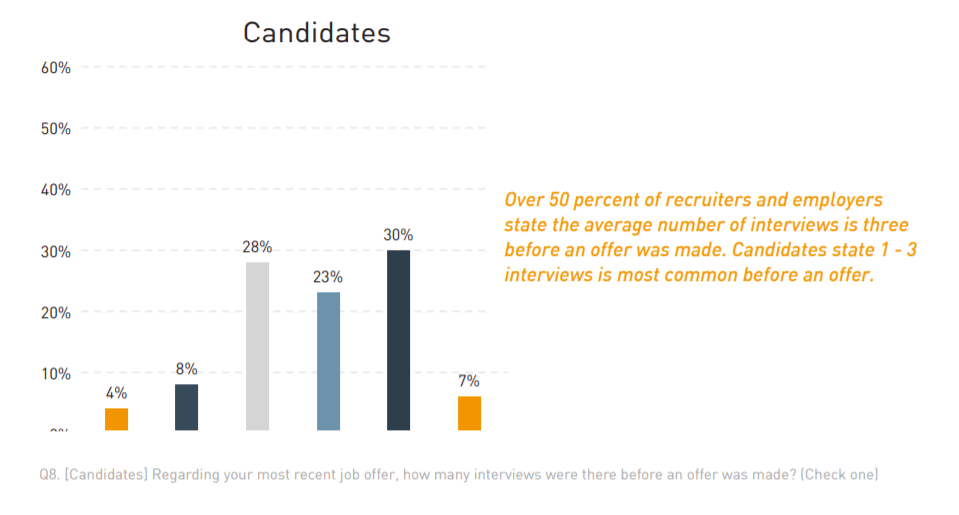 Source: MRINetwork
Source: MRINetwork
Remember that when your hiring process takes too long, other companies may extend the offers before you are ready. According to Google’s research, four interviews is enough to make a good hiring decision so you really shouldn’t let your interview process drag on.
2. Review the job description
When getting ready for the interview, start with the basics and verify if the job description accurately reflects what is required of the person. See if it needs any updates and memorize the most important aspects.
Prior to meeting the first candidate, compile a list of the attributes required. According to Dr. John Sullivan, you should turn to your top performers for inspiration. Ask yourself the following questions:
– What makes them so good?
– What do they have in common? Have they accomplished similar achievements before joining your company?
– In what way are they resourceful?
– Which of their skills and traits make them so valuable?
3. Look at the candidate’s school & work history
Conducting an interview in tech should create a positive candidate experience, which relies strongly on personalization. Showing someone you did research on them (of course to the extent when it’s not creepy) is a nice touch because it’s a sign of treating someone seriously. The interview is not the time to familiarize yourself with CVs or Stack Overflow reputation – you should definitely do it beforehand and stay focused. There’s nothing worse than being interviewed by people who have no idea of your skills, professional experience, educational background, and who generally don’t show any interest in you. Remember that due to the prominence of social media, a bad interview experience is like a bomb which can potentially explode in front of other candidates. Prevention really is key.
4. Demonstrate your employer branding and company culture
Conducting an interview gives you a great chance to demonstrate your employer branding and company culture. This means that apart from focusing on the candidate, you should also spend time on figuring out how you want to present your company. After all, since the majority of developers are passive candidates, many of them are inundated with recruiter mail. This means they can be very selective when it comes to choosing who they’d like to be interviewed by.
That’s where recruitment marketing comes in. In the last years, the role of the recruiter has changed significantly and the interview room is now a place where you get to form some sort of an opinion on the candidate, but also where they get to form an opinion of the organization.
According to SmashFly Recruitment Marketing Report Card for the 2016 Fortune 500, Tech comes fifth on the list of most recruitment marketing-savvy industries, which means there’s still a lot of work to be done.
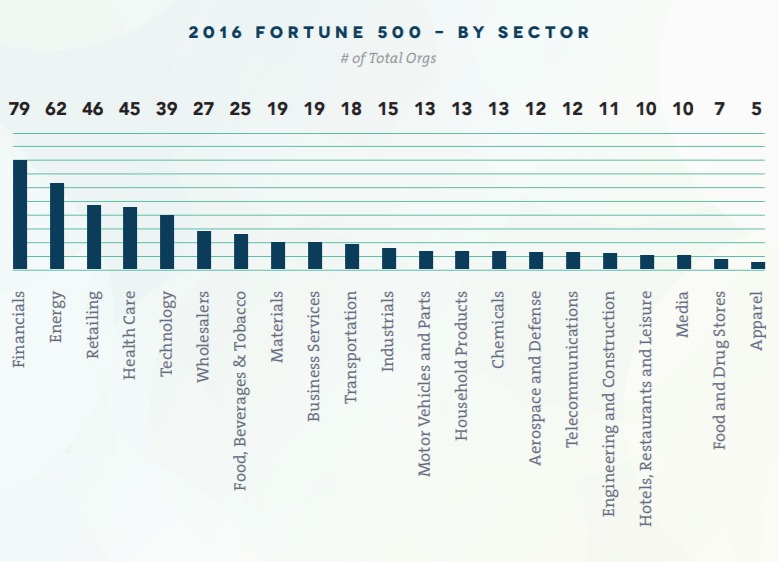 Source: SmashFly
Source: SmashFly
Before conducting an interview, gather and memorize the information you need to present your organization’s strategy and structure. Here’s a helpful cheat sheet by Workable which can help you get ready:
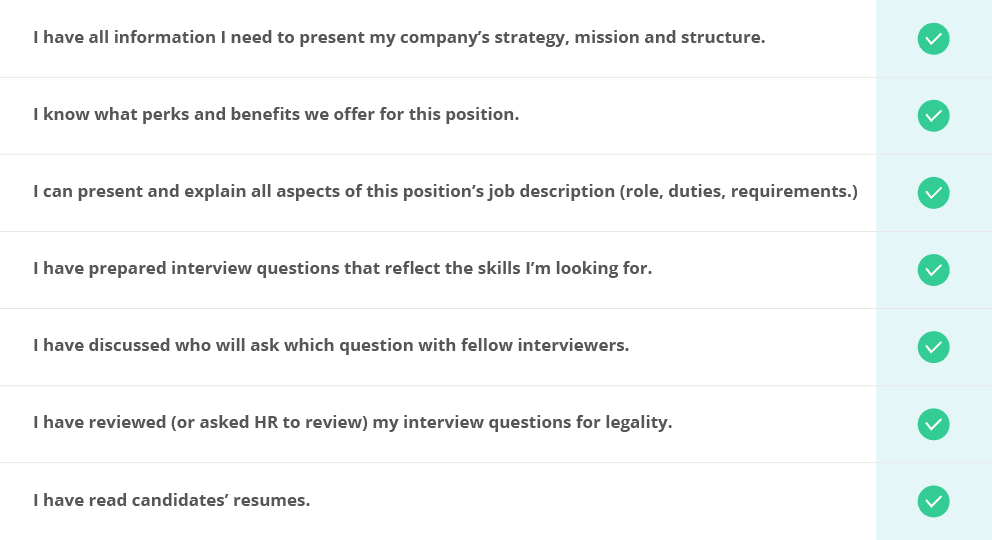 Source: Workable
Source: Workable
5. Anticipate the candidate’s needs
As a recruiter, it’s your role to figure out what a given candidate wants in a new role and what can help you make them accept your offer. Is it professional advancement? Flexible working hours? Remote options?
Figure out what could make them sign with you and try to attend the interview with that particular person’s preferences in mind. Have unique, meaningful conversations and be prepared to answer the questions that might arise. If you need to come back with an answer, make sure you do that in a timely fashion. If you’re considering relocation, discuss the area, housing, schools and so forth.
In fact, interviewing candidates who need to travel to speak to you is tricky because oftentimes you fly them to your location only to spend an hour or so to talk to them. The worst case scenario realizing you shouldn’t have invited them in the first place because it’s awkward to let them go too quickly so they don’t feel like they’ve wasted their time. Solution? Ask them to take a test before you offer to fly them over to see you.
6. Don’t ask random questions
When it comes to tech, the problem with conducting interviews in the traditional sense is often that the interviewees don’t know the answers to the questions they’re asking. At the same time, it’s virtually impossible to involve your IT department in tens of interviews. It’s also highly unresourceful as developers are busy people.
Luckily, the way out of this conundrum is pretty straightforward. The best way is to use technical screening automation tools so that you assess coding skills objectively and fairly before the onsite interview. This also allows you to eliminate the impact of unconscious bias which leads to more diverse and more productive teams.
Sahat Yalkabov’s Medium post got a lot of attention when he described the dehumanizing technical interviews (either phone interviews or onsite ones). Sadly, both phone screening and interviews are often conducted by people don’t code but are given a set of outdated questions which cannot be answered with a simple yes or no. To quote Yalkabov, “At one point I had to explain to one of the interviewers about blocking and non-blocking nature of JavaScript, and why my answer was correct and his premise — wrong.” He was later asked another round of questions and then escorted to the lobby, which altogether added up to become his worst and most frustrating interview experience.
Another problem is that many recruiters don’t understand the IT terminology or even worse, pretend to understand it (trust me, your candidates know). At this point, I’d like to point you to our Glossary of IT terms for tech recruiters so you can brush up the most important terminology.
7. Offer live coding interviews
Conducting a skills assessment interview online without having to invite candidates to an onsite interview is especially important in the tech industry where relocation is common. Remember that online coding interviews should:
- Address a real business problem
- Be carried out under real-world conditions
- Be adjusted to the difficulty level of the position
Here’s what conducting an interview online looks like:
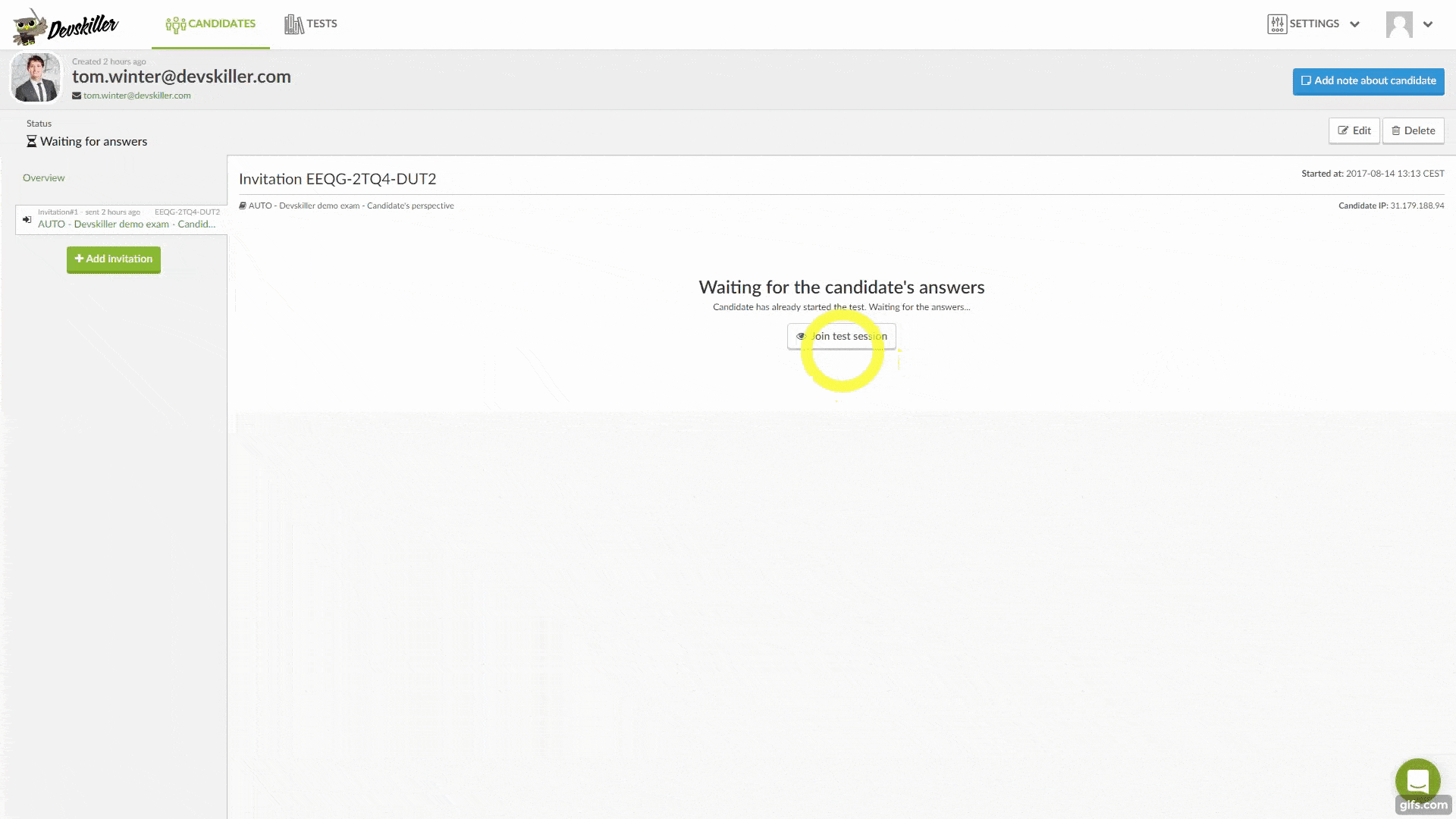
If you’d like to learn more about online coding interviews and live code pair interviews, we’ve published a full article on the subject which I wholeheartedly recommend.
Time to take action
Conducting an interview in tech is tough because as a recruiter you need to assess highly specialized skills that you don’t necessarily possess. That said, if you follow these seven steps, you’re bound to see great results.
Have you tried optimizing your interview process? If so, what steps did you take?




